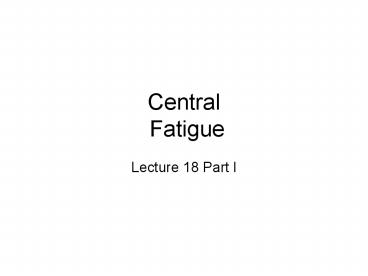Central Fatigue - PowerPoint PPT Presentation
1 / 14
Title:
Central Fatigue
Description:
endurance exercise is related to a buildup. of serotonin (a neurotransmitter) in the brain. ... endurance. Bottom line: the evidence to suggest BCAA ... – PowerPoint PPT presentation
Number of Views:337
Avg rating:3.0/5.0
Title: Central Fatigue
1
Central Fatigue
- Lecture 18 Part I
2
- Define fatigue.
- operating definition inability to
- maintain a desired level of intensity.
- We usually think of fatigue during exercise as
- occurring in the muscle e.g. glycogen depletion
or - some other limitation decreasing the ability to
- produce ATP at the necessary rate.
3
- Some work suggests other factors are involved.
- Coyle et al. infused glucose into the blood of
trained - cyclists (to make sure they were never limited by
- availability of carbohydrate) and, though they
were - never depleted, they fatigued and stopped cycling.
4
- In 1987, Newsholme et al. proposed a novel
- idea called the central fatigue hypothesis.
- The basis for the idea is that fatigue during
- endurance exercise is related to a buildup
- of serotonin (a neurotransmitter) in the brain.
5
- In 1987, Newsholme et al. proposed a novel
- idea called the central fatigue hypothesis.
- The basis for the idea is that fatigue during
- endurance exercise is related to a buildup
- of serotonin (a neurotransmitter) in the brain.
- It is true that increased levels of serotonin
causes - drowsiness and fatigue (many sleeping aids work
by - raising levels of serotonin in the brain).
- Tryptophan is an amino acid
- that is converted to 5-
- OH tryptamine and then
- to serotonin in the brain.
6
- In order to get into the
- brain, tryptyophan must
- cross the blood-brain
- barrier via a transporter.
- The transporter is not
- specific for tryptophan,
- it also transports
- branched chain amino
- acids (BCAA),
- so there is a
- competition
- for transport.
7
- During exercise, BCAAs are taken up by muscle
- and oxidized for energy.
- Late in exercise, when muscle glycogen stores are
- low, this process is accelerated. Greater uptake
of - BCAAs late in exercise leads to lower blood BCAA
- levels and increased ratio of tryptophan/BCAA.
- So more tryptophan gets into the brain
- more serotonin production.
- In addition, as exercise progresses, more free
fatty - acids (FFA) are liberated from triglyceride
stores - and blood level of FFA goes up.
8
- FFAs and tryptophan are both
- transported in the blood by
- albumen (a common plasma protein).
- As level of FFAs goes up, more tryptophan is
- displaced from binding sites on albumen and the
- free tryptophan concentration rises.
- So, increased BCAA uptake by muscle AND
- decreased binding capacity by albumen greatly
- enhances the transport of tryptophan into the
brain - Hypothesis increased tryptophan into brain
more - serotonin central fatigue stop exercise.
9
FFA
tryptophan
FFA
albumen
FFA
BCAA
10
- How do you test the central fatigue hypothesis?
- What things do you need to know?
- Does the ratio of tryptophan/BCAA in the blood
- increase during exercise?
- 2. Is there increased entry of tryptophan into
the brain? - 3. Does it cause more production of serotonin?
- 4. Does that change in serotonin cause more
- fatigue?
11
- Because supplement industry is driven
- by business and not scientific motives,
- the FIRST studies actually done tested
- the effects of supplements on humans.
- A rational approach would have been
- to supplement with tryptophan and see if it
caused - MORE fatigue. But, b/c you cant make money from
- an ergolytic (inhibiting performance) compound,
the - first studies tested the efficacy of BCAA
supplements - to delay time to fatigue in athletes.
- Complications time to fatigue is easy to
measure - in theory but hard to interpret.
12
- In mid-90s, dozens of studies looking at effects
of - BCAA (with and w/o CHO) on performance. Most
- showed no effect. Some improved performance but
- studies were usually seriously flawed.
- e.g., Blomstrand et al. in 1991 studied effects
of - BCAA ingestion vs. flavored water on marathon
- runners. No effects unless divided group into
fast - and slow, saw improvement in the slow
runners. - Flaws
- 1. subjects in 2 groups not matched
- 2. did not control energy or CHO intake
- 3. division of runners arbitrary
13
- Finally, in about 2003, a group of investigators
- infused tryptophan into the bloodstream of
rodents - and looked at the uptake into the brain and time
to - exhaustion. They found that the greatly elevated
- levels of tryptophan in the blood did change the
- BCAA/tryptophan ratio but had no effect at all
on - endurance.
14
- Bottom line the evidence to suggest BCAA
- supplements improve endurance performance is
- almost non-existent. The best designed studies
all - show negative results.































